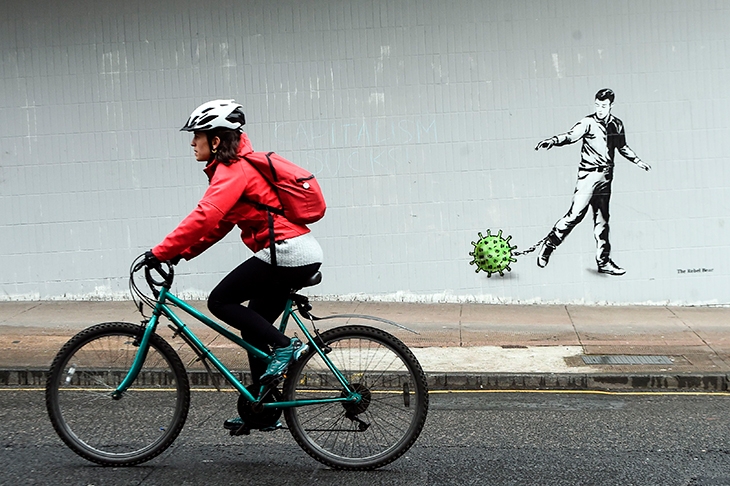When the Prime Minister sets out his ‘roadmap’ for easing Covid restrictions on Monday, it will be against a backdrop that is both better and worse than could have been imagined six months ago. Worse because we have gone on to suffer a second wave of the disease that has seen almost as much excess death as the first wave. But better in the sense that we have vaccines that are in use and more effective than many hoped, with first doses given to 15 million people — almost a third of the adult population.
On several occasions last year, Boris Johnson referred to vaccines as the cavalry coming over the hill. The cavalry is here, and most of those at serious risk of dying from Covid are being inoculated. So why are we being fed such low expectations of when the economy and society will be allowed to re-open? And also being told that, rather than a restoration of liberty, we may be going into a regime of domestic vaccine passports where our ability to move around is linked to health status? ‘No jab, no job’ policies may be introduced in offices, with the connivance of a government supposedly opposed to the discrimination this would bring.
The moving of goalposts has become a worrying, illiberal theme for this government. In early January, there was an expectation that schools would go back after half-term this month, assuming the target of vaccinating the over-seventies had been achieved. There was no doubt, we were told, that ministers knew how children were being harmed academically, emotionally and physically by the isolation of remote learning. The vaccination target was hit and Covid cases have plunged by two thirds. But schools will not be going back until 8 March at the earliest — and then perhaps only partially.
The cavalry is here, so why are we being fed such low expectations of when society can reopen?
Despite the fact that all over-fifties are likely to have had their first dose by the end of March, the high street, it seems, will not be allowed a proper reopening before April, and pubs not until May. Government advisers have even suggested that social distancing restrictions might be in force all year. Foreign travel has been made horribly unpredictable through the new rules on hotel quarantine. Ministers used to speak about lockdown being a tool needed to protect the NHS, to stop hospital wards from becoming overwhelmed. Now they seem reluctant to do anything until new infections are down to a trickle.
It is striking to see Tony Blair re-emerge leading the campaign to introduce vaccine identity cards. He failed to bring in a version of this as prime minister, but seems to have found a back door into government by advising Matt Hancock, the Health Secretary. All this gives the impression of a Prime Minister not really in charge, being directed like a wonky shopping trolley by ministers and advisers who have their own agenda.
There does not appear to be a problem with the Pfizer or AstraZeneca vaccines. The real-world data that is beginning to emerge suggests they have proved as effective as trials suggested. Given that the age groups so far vaccinated have accounted for around 88 per cent of all deaths in the epidemic, the virus should already have been stripped of much of its threat. New infections, hospital admissions and deaths are all falling steeply, at a rate of around a quarter per week — more steeply than they fell after the first wave, in spite of the new variants. Yet the prospect of a return to normality is being pushed ever further into the distance.
It is understandable, given how the second wave rolled in last year, that the government should want to exercise caution. But remaining in lockdown involves risks, too. Damage is being inflicted to mental health and child development. Poverty is on the rise. The apparent lobotomisation of the Labour party means that no one is speaking out for the causes the party was founded to protect. The government, in practice, has no effective opposition and no one to point out the side effects of its lockdown policies.
Lockdown was always about a balance of risks. But there is no balance of debate in ministerial statements or the increasingly brutal government adverts. No graphs on cancer diagnosis are shown at No. 10 briefings. Teaching unions are lobbying only for the adults. It is amazing how quickly advocates for the marginalised have vanished. All of which contributes to a dangerously one-sided discussion.
Johnson has been criticised as the wrong man to be PM at a time of grave national crisis because of his optimism bias, but that misses the point. The reason the public have been so accepting of lockdown rules is that they see a light at the end of the tunnel — and Johnson is responsible for providing at least some of that light. He must not allow that optimism to slip away now. He also needs to provide grip. If he opposes ‘no jab, no job’ policies, he must say so.
No one expects the Prime Minister to announce the immediate dismantling of Covid restrictions on Monday. The government will rightly want to phase in the return of our freedoms. But Johnson has sold us the promise of a future in which vaccines return us to normal life and liberty. He needs to deliver on that promise.






Comments